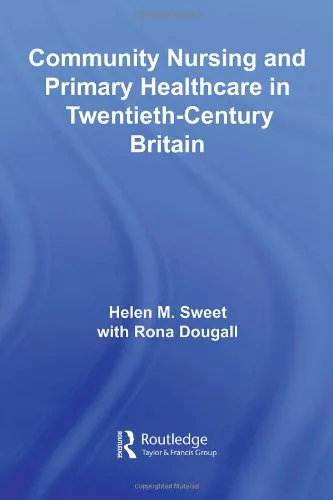Community Nursing and Primary Healthcare in Twentieth-Century Britain (Routledge Studies in the Social History of Medicine)
4.6
بر اساس نظر کاربران

شما میتونید سوالاتتون در باره کتاب رو از هوش مصنوعیش بعد از ورود بپرسید
هر دانلود یا پرسش از هوش مصنوعی 2 امتیاز لازم دارد، برای بدست آوردن امتیاز رایگان، به صفحه ی راهنمای امتیازات سر بزنید و یک سری کار ارزشمند انجام بدینمعرفی کتاب
کتاب Community Nursing and Primary Healthcare in Twentieth-Century Britain بخشی از مجموعه Routledge Studies in the Social History of Medicine است که توسط من، هلن ام. سوئیت نوشته شده و به بررسی توسعه و تحولات پرستاری جامعهمحور و مراقبتهای بهداشتی اولیه در بریتانیا طی قرن بیستم میپردازد. این کتاب با ترکیب دیدگاههای تاریخی و تحلیل اجتماعی، نقشی محوری در فهم تغییرات ساختاری در زمینه مراقبتهای بهداشتی و تأثیر پرستاران در جوامع ایفا میکند.
خلاصهای از کتاب
کتاب به چهار موضوع اصلی پرداخته است. نخست، معرفی مفهوم Community Nursing و چگونگی پیدایش آن در اواخر قرن نوزدهم و اوایل قرن بیستم و رابطهاش با تغییرات شبکههای اجتماعی و اقتصادی در بریتانیا. بخش دوم، به پیشرفت Primary Healthcare در کنار رویکردهای تازه به سیاستهای بهداشتی-اجتماعی و نیازهای مختلف جامعه میپردازد. سومین محور، تمرکز بر تأثیر عوامل بیرونی، همچون جنگهای جهانی، بیماریهای همهگیر، و مقررات دولتی است و در نهایت، چالشها و دستاوردهای پرستاری جامعهمحور و تغییر نقش پرستاران از خدمات سنتی به مدلهای مدرنتر پوشش داده میشود.
در کل، این اثر به صورت دقیق و جامع، ارتباط میان جغرافیای پزشکی و زیرساختهای اجتماعی، با تمرکز بر «چرایی» و «چگونگی» موفقیت یا کاستیهای سیستم بهداشت اولیه بریتانیا بررسی شده است.
دستاوردهای کلیدی کتاب (Key Takeaways)
۱. پرستاری به عنوان یک نیروی اجتماعی: نقش پرستاران جامعه در ایجاد دسترسی به بهداشت و کاهش نابرابریهای بهداشتی تحلیل شده است.
۲. تغییرات سازمانی: نحوه تغییرات سیاستگذاری دولتی و تأثیر اصلاحات بر ساختارهای Primary Healthcare.
۳. اهمیت آموزش و نوآوری: تربیت پرستاران متخصص و ایجاد استانداردهای جدید آکادمیک برای بهبود خدمات بهداشتی.
جملات مشهور کتاب
"The essence of public health and nursing lies not just in clinical excellence but in understanding the nuanced needs of the community."
این جمله، به اهمیت درک تفاوتهای فرهنگی، اقتصادی و اجتماعی در ارائه خدمات بهداشتی اشاره دارد و فلسفه بنیادین کتاب را بازتاب میدهد.
چرا این کتاب مهم است؟
این کتاب برای دانشجویان تاریخ پزشکی، پرستاران، سیاستگذاران بهداشتی و حتی عموم مردم ارزش خاصی دارد زیرا دیدگاهی جامع و جالب نسبت به تأثیر تحولات اجتماعی بر پرستاری و سلامت عمومی ارائه میدهد. همچنین، با تحلیل این تحولات، روشن میسازد که چگونه تاریخ بر سیاستها و عملکردهای امروز تأثیر گذاشته است.
این اثر همچنین میتواند الهامبخش نسل جدید پرستاران و متخصصان باشد تا چالشهای مدرن بهداشت جامعه را با الهام گرفتن از موفقیتها و شکستهای گذشته مدیریت کنند.
Introduction
Community Nursing and Primary Healthcare in Twentieth-Century Britain offers an in-depth exploration of the profound developments in public health and community nursing from the late 19th century through the transformations of the NHS in the post-war period. This book, part of the Routledge Studies in the Social History of Medicine series, delivers a comprehensive historical analysis of how healthcare provision evolved to meet the changing needs of Britain’s population over the 20th century. By detailing the policies, cultural shifts, and professional challenges faced by community health practitioners, it examines the pivotal role of nurses and primary healthcare workers in shaping Britain’s healthcare landscape.
Building on archival research, oral histories, and liberal interpretations of social and political reforms, this work unpacks the intersection of gender, class, and professional identity in community health practice. Aimed at historians, healthcare professionals, and policymakers, it provides valuable insights into the development of modern healthcare systems and the enduring significance of community nursing.
Detailed Summary of the Book
The book chronicles the evolution of community nursing and primary healthcare from its early roots in public health initiatives to its central role within the modern National Health Service (NHS). It begins by examining the role of district nurses and midwives in late 19th-century Britain, where services were often localized and informal, shaped largely by charitable organizations and the needs of impoverished communities.
As the 20th century advanced, the establishment of the NHS in 1948 brought about significant changes in the delivery of healthcare. Community nursing became more structured and integrated into national policies, driven by the broader objective of making healthcare universally accessible. Against this backdrop, the book highlights the experiences and challenges faced by nurses working amidst scarce resources, societal expectations of women as caregivers, and the ongoing professionalization of nursing.
A major theme in the book is the widening scope of primary healthcare, particularly during the mid-20th century, when general practitioners (GPs), health visitors, and public health nurses began to collaborate more extensively. Issues such as housing conditions, maternal and child health, infectious disease management, and health education are examined in depth, illustrating how nurses worked at the frontline of tackling these societal challenges.
Key Takeaways
- The book highlights the critical importance of community-based care in addressing public health challenges during the 20th century.
- It provides a nuanced understanding of the professionalization of nursing and the expanded roles of community health practitioners.
- Analyzing historical healthcare policies and reforms, the book situates community nursing as an essential aspect of the British healthcare system's success and resilience.
- It sheds light on the ongoing struggles of community health workers as they negotiate societal expectations, systemic constraints, and gendered professional identities.
Famous Quotes from the Book
"Community nurses were not merely caregivers; they were agents of change, working tirelessly to improve the collective health of their communities and bridge the gap between policy and practice.”
"In the hands of Britain’s community nurses, primary healthcare became a force for equity, justice, and transformation—a testament to their unwavering dedication to the common good."
Why This Book Matters
Community Nursing and Primary Healthcare in Twentieth-Century Britain is a significant contribution to the social history of medicine because it highlights the vital yet often overlooked role of community nursing as the backbone of primary healthcare. By focusing on personal narratives and historical evidence, it situates community healthcare workers within broader discussions of social progress, gender roles, and political change.
The book's relevance extends beyond historical interest; it provides a valuable framework for understanding current challenges in community nursing and healthcare systems. Many of the issues faced in 20th-century Britain, such as resource allocation, professional recognition within medical hierarchies, and the tension between public and private care, resonate with contemporary healthcare debates. For policymakers, historians, or healthcare professionals, this book offers essential lessons on the importance of community healthcare as both a profession and a mission.
دانلود رایگان مستقیم
برای دانلود رایگان این کتاب و هزاران کتاب دیگه همین حالا عضو بشین
برای خواندن این کتاب باید نرم افزار PDF Reader را دانلود کنید Foxit Reader


